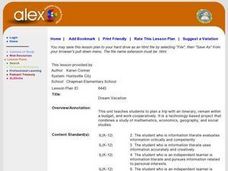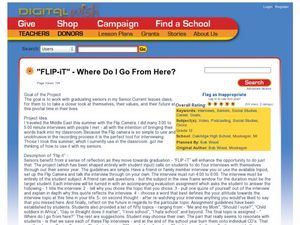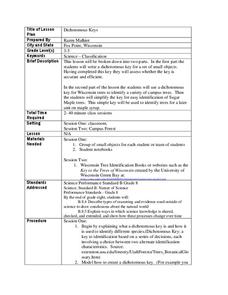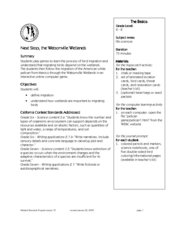Curated OER
Cherokee Leaf Printing
Young scholars investigate their local creeks and forests and practice identifying trees. For this ecology identification instructional activity, students utilize a pad and pencil while on a field trip near their school and...
Curated OER
Dream Vacation
High schoolers research cities, states, or countries using the internet and other resources to learn about a vacation spot. They make a final presentation of their findings in forms other than a written report.
Curated OER
Internet Exploring
Students access the Internet to answer a variety of questions posed in this technology lesson.
Curated OER
A Visit to Japan
Students are introduced to the culture and geography of Japan in his ten lessons unit. The cultures of indigenous peoples in various times in their local community are explored through a variety of art forms, listening, writing, and...
Curated OER
Looking at Life through the Creation of Personal Metaphors
Students focus on the creation of personal metaphors, which are first illustrated in pictures and caricatures and then extended to descriptive/analytical paragraphs. They teach the lesson to others using their own personal metaphors as...
Curated OER
A Visit to Japan
Studnets complete a variety of activities as they develop an awareness and appreciation of Japanese culture: geography, food, homes, holidays, celebrations, education, games, etc.
Curated OER
Traditional Japanese Dance
Students study introductory history and cultural purposes of selected Japanese dance forms. They analyze the philosophical beliefs, social systems, and movement norms that influence the function and role of Japanese dance in the lives...
Curated OER
Water Cycle and Its Movement in the Soil
Students are introduced to the water cycle and water movement in soil. In this water cycle lesson, students explore how water moves through the water cycle and discuss water sources, natural reservoirs, soil...
Curated OER
Who's in my soil!?!...and just what do they think they're doing there?
Young scholars discover organisms that inhabit the soil, the beneficial an detrimental roles these organisms play, and the interactions between the organisms and their environment and other organisms. Students participate in four...
Curated OER
Moon
Students discover scientific facts about the Moon and how
some American Indian Tribes used the moon to measure time.
They accomplish this by listening to stories and poetry, writing
stories, communicating with an astronaut,...
Curated OER
You Too Can Haiku
Students conduct Internet research and explain the history of Haiku. After listening and reading various examples of Haiku, students use their own vocabulary and practice their math skills to determine the correct number of syllables...
Curated OER
So, So Surreal Self-Portraits
Students take virtual trip back in time to 1924 when a Dada manifesto sparked the Surrealist movement in Europe and the United States. They explore about the history of Surrealism and visit online galleries of notable artists of the past...
Curated OER
Scientific Method Study Guide
For this scientific method worksheet, students answer questions about the various steps of the scientific method. They distinguish between the variables in an experiment and between a hypothesis and a theory.
Curated OER
"Flip-it" - Where Do I Go From Here?
Twelfth graders interview themselves reflecting on various topics. In this self-reflection lesson, 12th graders video tape four different interviews throughout the year of themselves discussing various topics, with the last prompt...
Curated OER
Dress Like A Frog
Young scholars recognize amphibian adaptations. In this amphibian lesson students explore amphibian adaptations that provide for successful living in their environments. A volunteer dresses up with all of the adaptations using everyday...
Curated OER
A Plane Old Time
Fourth graders become familiar with a chart and use the information to create a flight plan. In this flight plan lesson, 4th graders access background knowledge of the role of flight controllers and the number concepts they...
Curated OER
Dichotomous Keys
Young scholars utilize dichotomous keys to identify trees in their schools. In this ecological identification lesson, students practice creating dichotomous keys based on simple subjects such as hair color or sex of a person....
Curated OER
How Trees Contribute to the Water Cycle
In this water cycle instructional activity, 3rd graders conduct an experiment where they observe and calculate how water transpires in different types of trees. Students engage in a class discussion and use Venn Diagrams to compare...
Curated OER
Flowerpots and Families
Students explore the importance of family communication and cohesiveness. In this family life lesson plan, students complete activities which demonstrate the characteristics of a strong family that is committed to staying together.
Curated OER
Conditions of City Life in the Late 19th Century
Students examine tenement life. In this activity on early urbanization, students research the role of journalism for social change in early American cities. Students write a journal article for themselves that demonstrate an...
Curated OER
Creating Characters
Learners examine the methods of effective characterization. In this writing skills lesson plan, students discuss how emotions, dialogue, actions, and physical descriptions build believable characters. Learners then use the methods of...
Curated OER
Child Safety Brochure
Students practice communication skills through brochure writing. In this child safety brochure lesson, students gather important child safety information and rewrite it into a brochure. Students must use correct language....
Curated OER
Next Stop, the Watsonville Wetlands
Students study bird migrations and the importance of wetlands. In this migration lesson students play a game and complete a computer activity.
Curated OER
Watershed Landscape
Students demonstrate how water flows by building a human watershed using themselves. In this ecology lesson, students compare and contrast point-source and non-point source pollution. They write what they have learned from this activity...

























